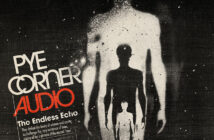Uk folk artist Gavin Miller, perhaps best known as one half of electronic ambient duo Worriedaboutsatan, has offered a number of solo releases including last months Shimmer (You can read our review here). This is his Lost Tribe Sound debut.
It’s all about stillness and simplicity. It’s a deeply held breath and long exhale, designed to lull you into its gentle peaceful world. The ingredients are sparse, filled with space for reverberations and introspection. It makes you focus on and find joy in a microscopic texture, or the moment a second guitar emerges in the mix. It makes you find joy in your own breath, in the beating of your heart. Miller provides space for this. He uses repetition, setting a guitar motif early and maintaining it throughout the piece. There are no changes, no surprises.
It’s an album split into two parts of four. The first four pieces, titled Upper Course (I-IV), all feature the cello of Aaron Martin, which just emerges midway and seems to tie everything together. At times he replicates the guitar, extending it into a mournful soliloquy, at others he offers a shimmering roughage, almost reminiscent of post rock density building. The diversity with which he approaches his cello on these pieces is astounding. Both artists are doing so much with so little. Miller meanwhile provides guitar, field recordings, some light percussion on the fourth piece, and also some organ/ soft synths.
Lower Course provides the significantly sparser original pieces, demonstrating what Martin had to work with. Curiously it doesn’t feel bare or lacking in any way, just different. The diference between one and two personalities, between a singular and shared vision. What’s fascinating here is the soothing power of repetition, as these pieces just roll on endlessly. And you don’t want them to end. Developments come via the introduction of new instruments or sounds, and this happens rarely, so in a sense the music just holds you, allowing you to drift into your own internal reverie. This is quiet music, internal music, stately music. It refuses to be hurried. There’s something quite bold about presenting two versions of each piece on this album. It works because of the nature of the music. You drift in and out, only returning to the music periodically and when you do the familiarity is welcome. You don’t want this music to end.




